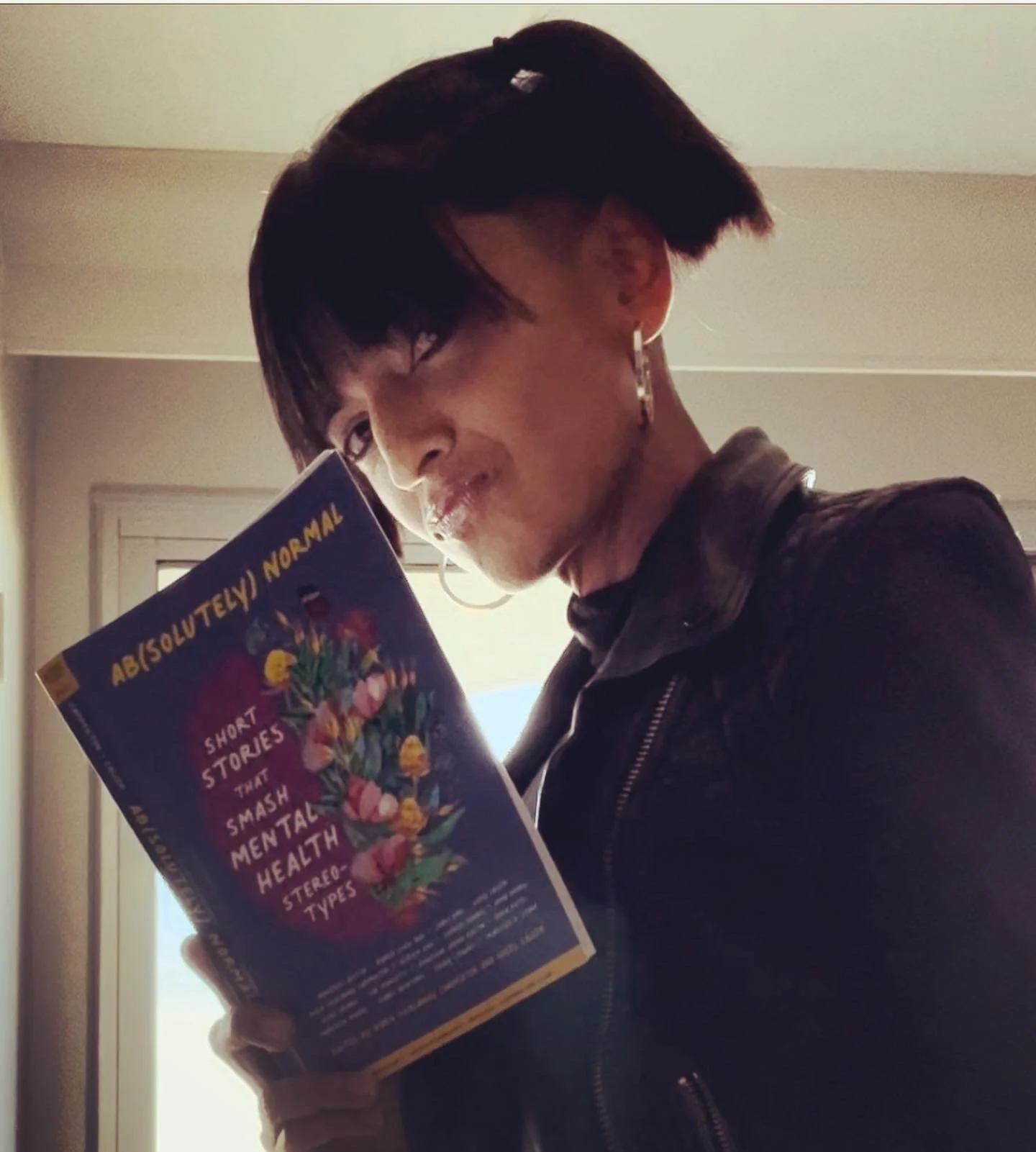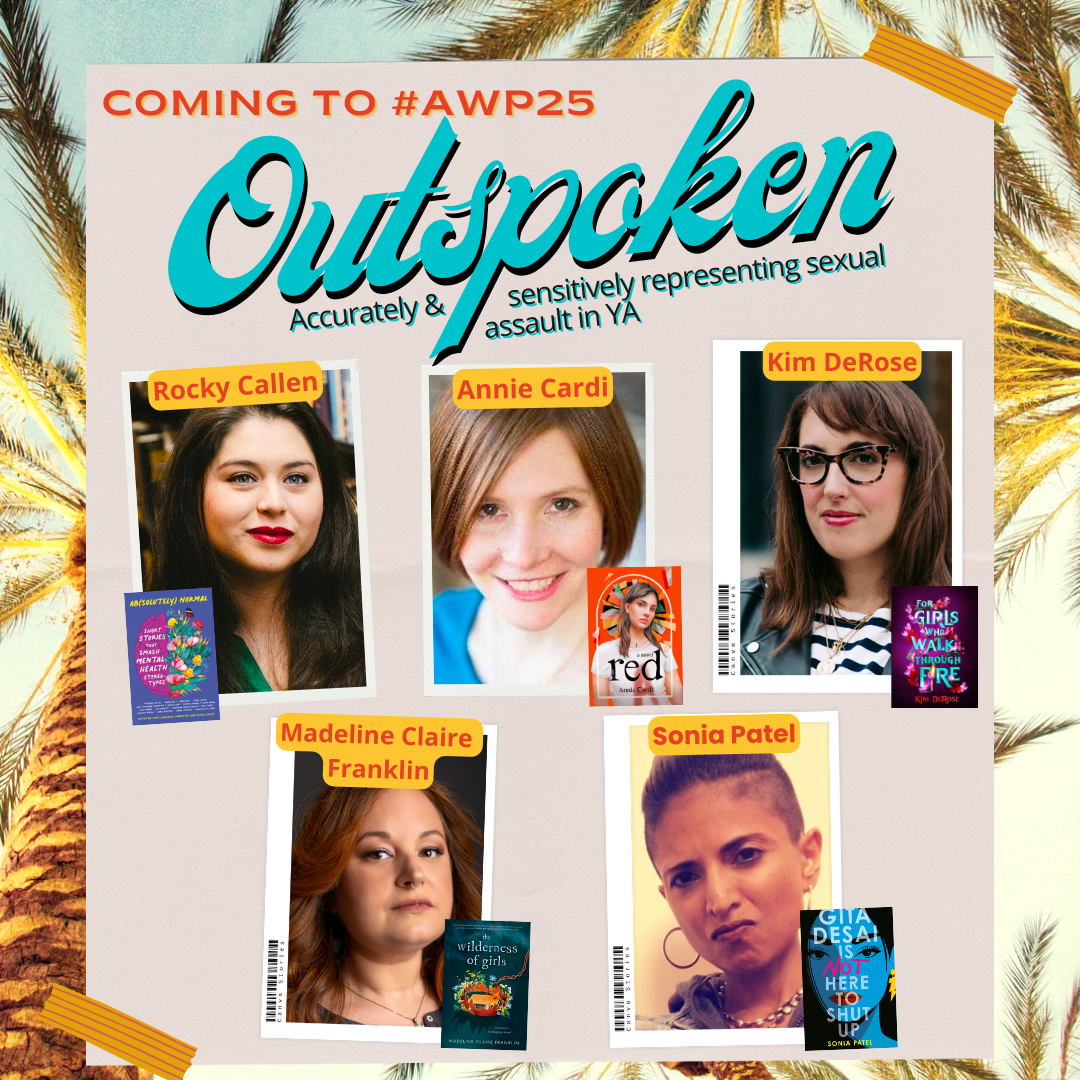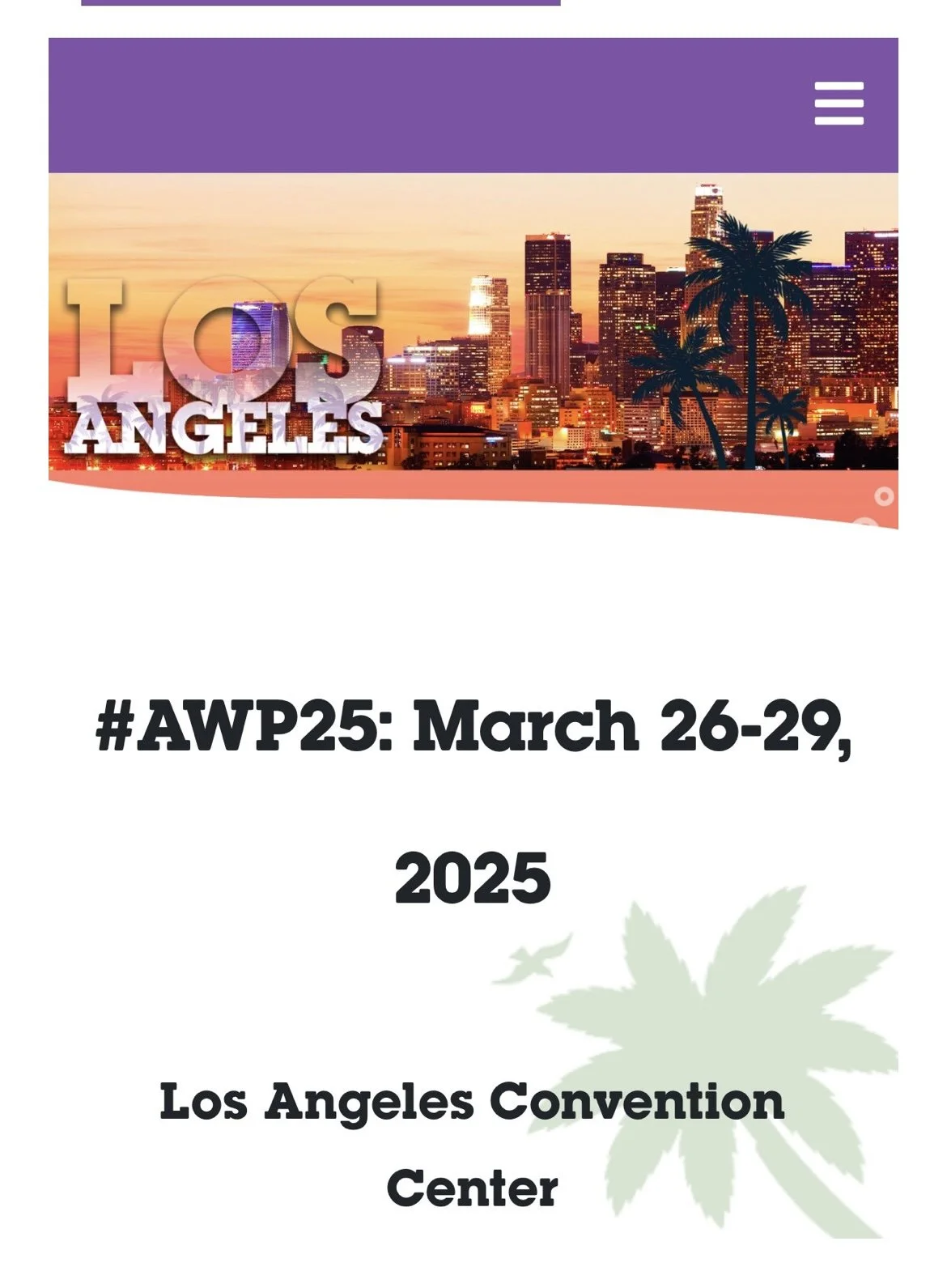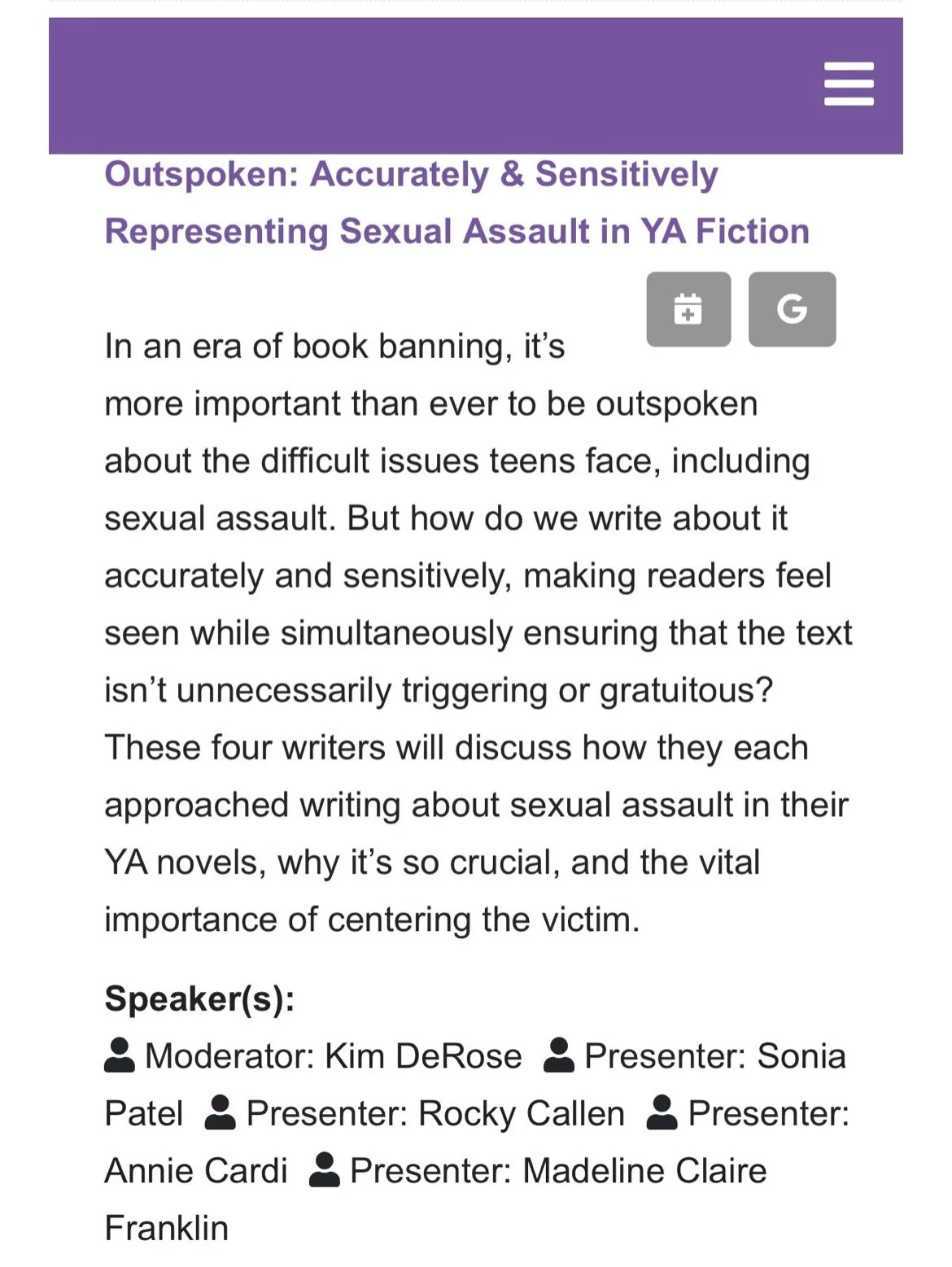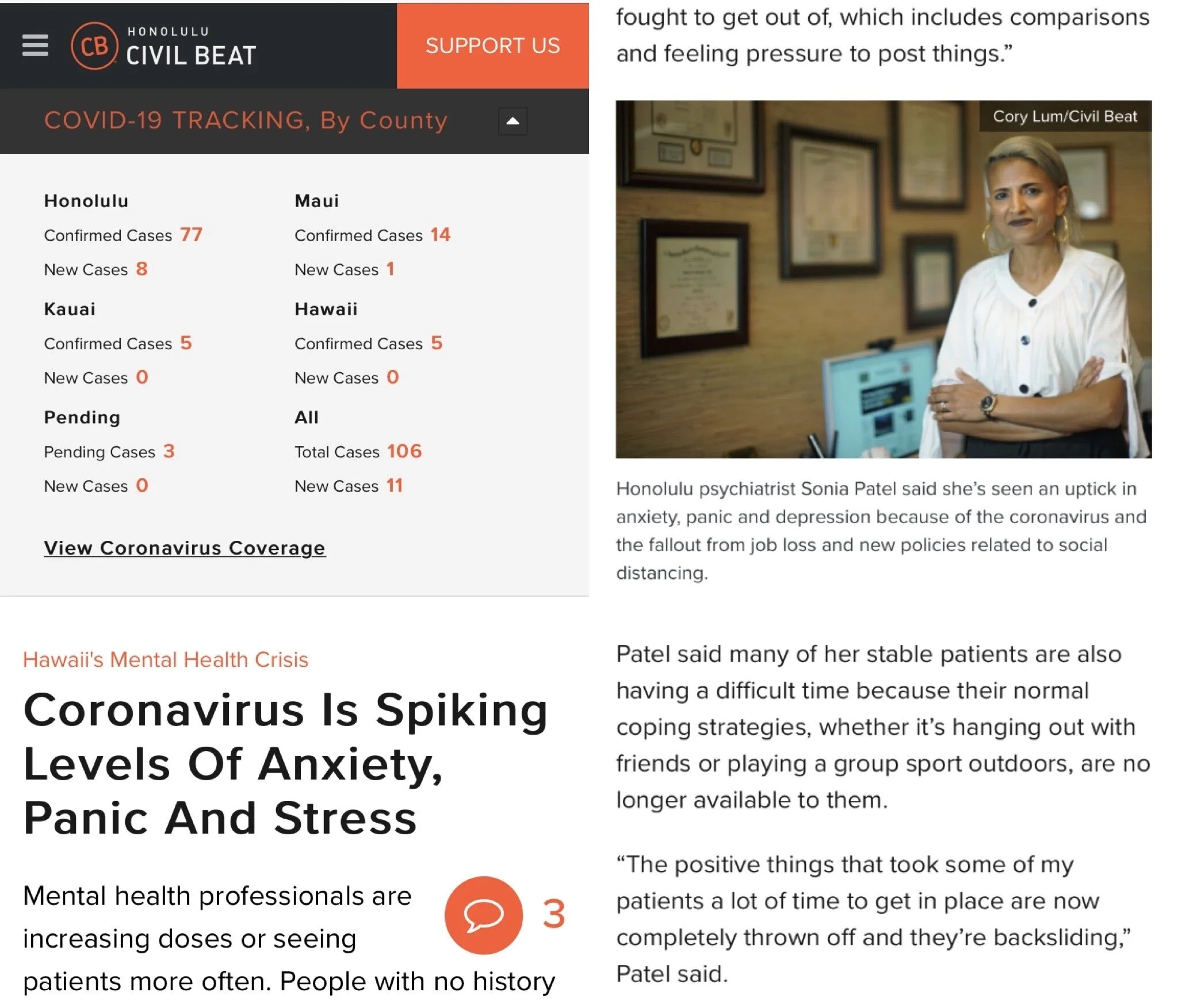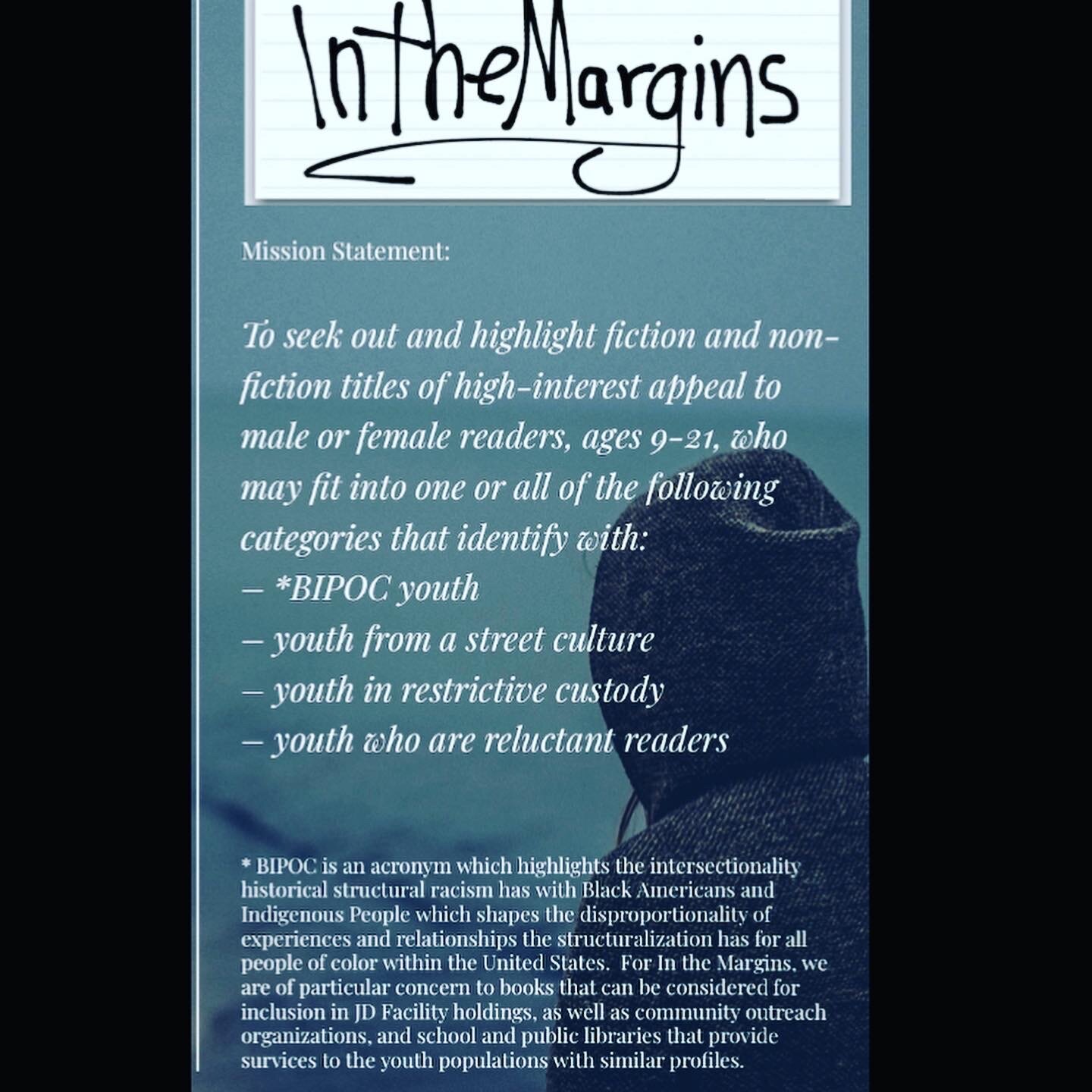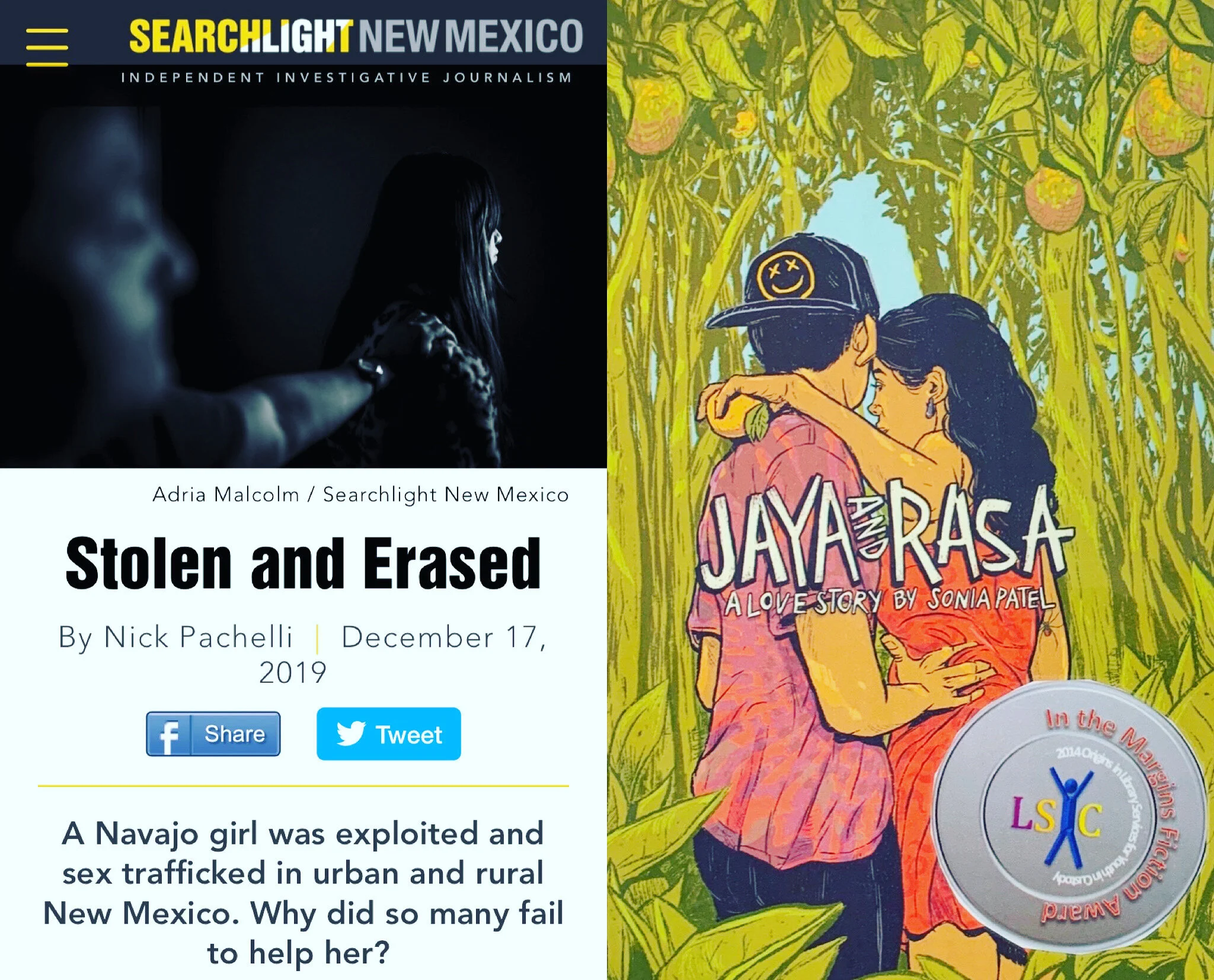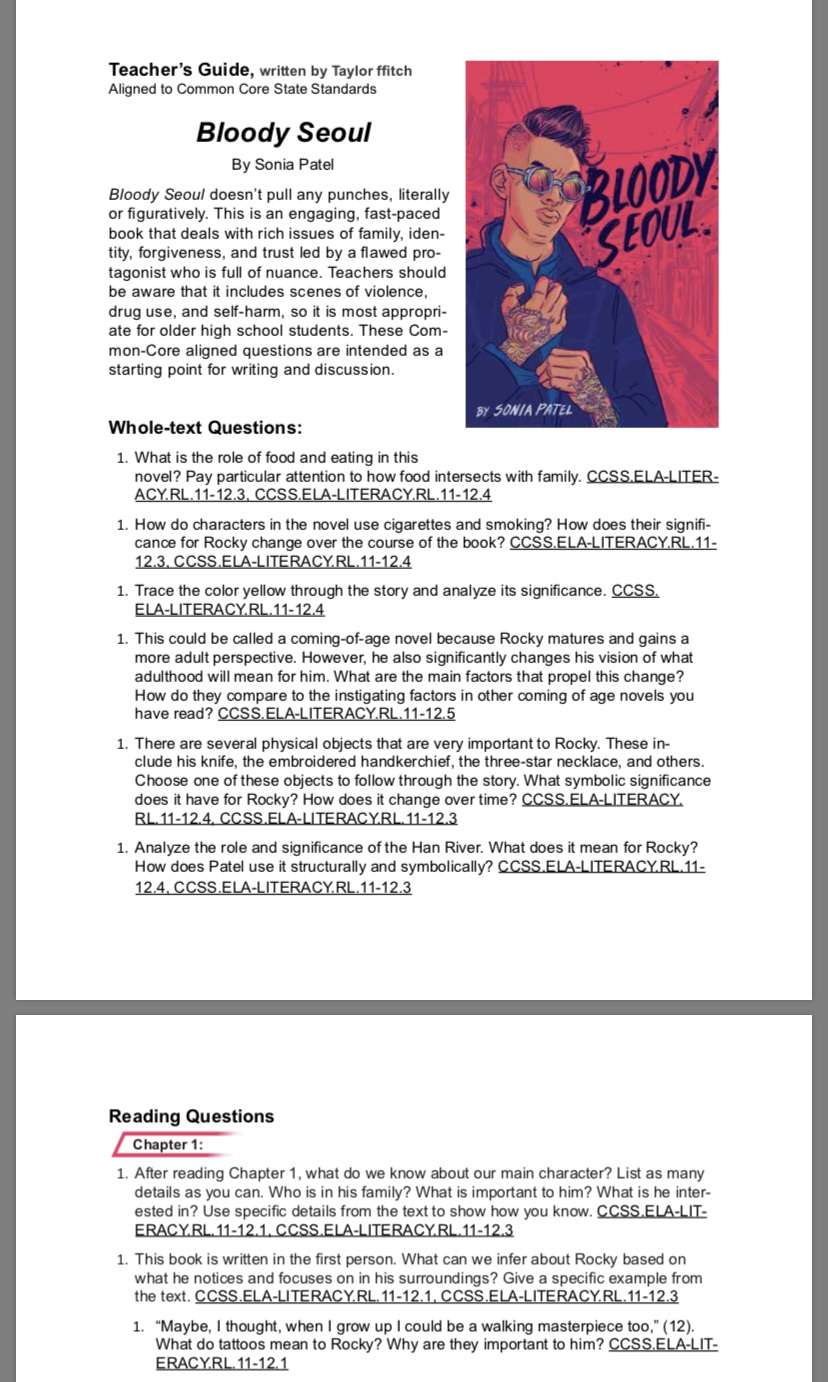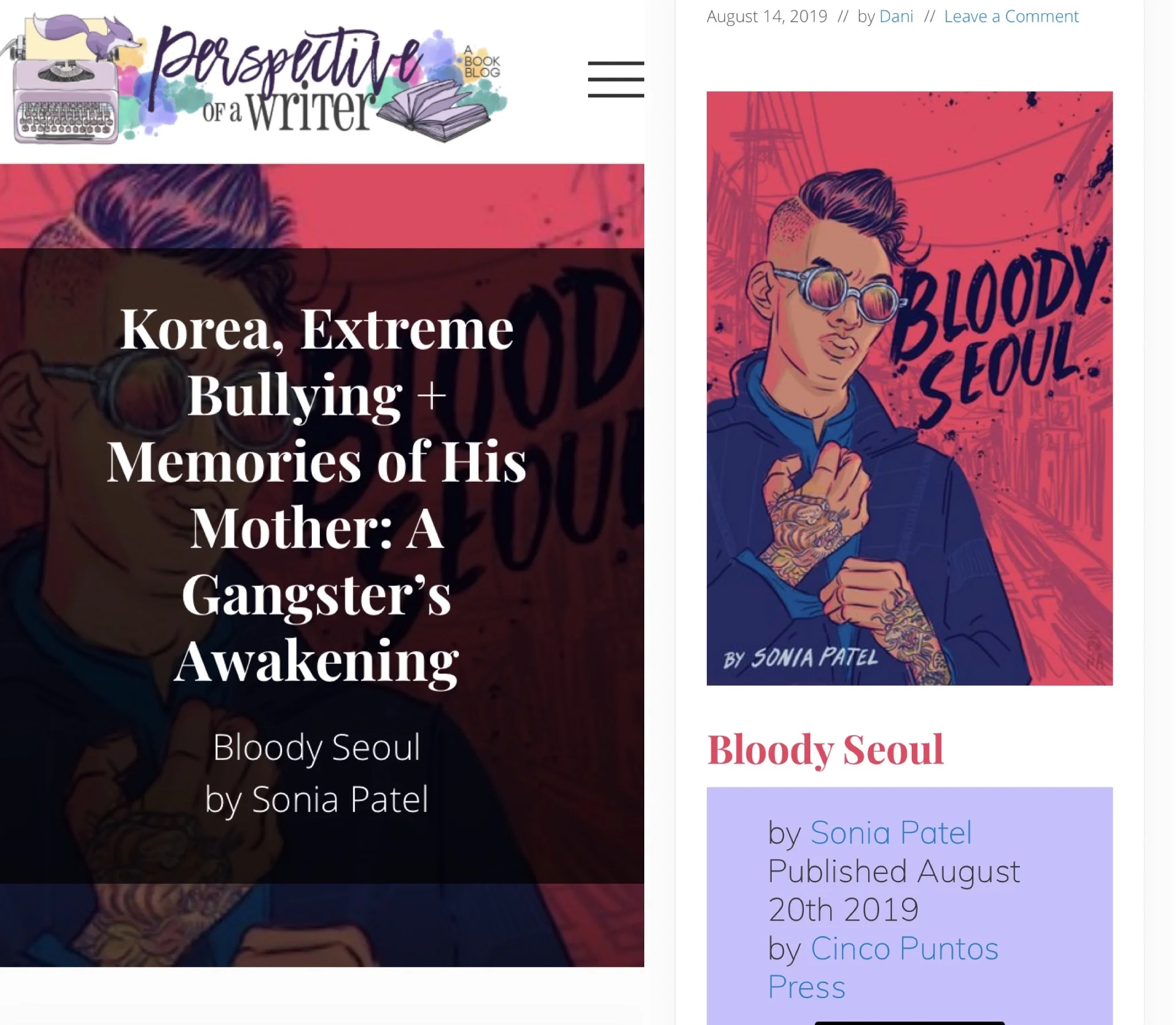mental health awareness
Musing on the Upcoming AWP Panel--Outspoken: Accurately & Sensitively Representing Sexual Assault in YA Fiction
The panel discussion is on Saturday, and I began this morning with a cup of coffee and reflection: Growing up, survivors of chronic childhood incest (covert and/or overt) lack the language to conceptualize or relate what was done to them because survival demands their brains/bodies disconnect from their reality. Brain/body development and connection is damaged and pain is manifested as symptoms of suffering. It would be unrealistic to depict young survivors in YA lit as “obviously feminist” or able to ask for help or have insight. To do so would be dismissive and belittling of the vast complexities of the incest survivor experience—including the familial and societal enabling of it—and I refuse to be an enabler because I am a survivor.
Therefore, it makes sense to me to introduce myself at the panel like this: I’m Sonia Patel, and I’m a practicing child, adolescent, and adult psychiatrist. I’m the first person on both sides of my Gujarati-Indian family to be born in the USA, specifically New York. I was raised there, Connecticut, and the tiny island of Molokai, Hawaii, where my debut YA novel RANI PATEL IN FULL EFFECT is set. Rani’s story is my story, if I’d known what chronic covert and overt incest were while I was going through it—a completely different beast than circumscribed sexual assault in how fundamentally it damages brain development—and something that wasn’t, until RANI, depicted in YA literature in a way that I or many of the teens I treat could’ve related to or found comfort in. My latest YA novel, GITA DESAI IS NOT HERE TO SHUT UP, is my college story and is a realistic depiction of some of the possible long-term fallout of incest, such as the repetition of the sexual object role as a mute language of chronic incest, because the truth is most incest survivors lack the language to conceptualize or explain what was done to them in their youth and often cannot comprehend or verbalize about it until middle age. By giving language to the complexities of incest (the secrets, the gaslighting, the isolation, the denial, the enabling by other family members, and the patterns of negative thoughts, feelings, and behaviors), I hope to offer young survivors the “aha moments” never offered to me: the possibility of understanding that what they’re enduring is abuse and the acknowledgement and validation of their painful experiences. As a survivor and a psychiatrist who treats survivors, I’m well aware that healing is impossible without the aforementioned.
HONORED THAT MY ESSAY IS INCLUDED IN THIS GROUNDBREAKING NEW ANTHOLOGY: JUST YA
AMAZING NEWS! A groundbreaking new YA anthology (grateful that my essay LETTER FROM YOUR NEW PSYCHIATRIST is included) will be live on September 2nd, and FREE off the Open OkState site. The paperback will eventually be available anywhere books are sold for the cost of printing and any bookseller mark-up. Thank you Sarah Donovon, editor, for your hard work and dedication on this incredible project!
From the introduction:
“JUST YA: SHORT POEMS, STORIES, & ESSAYS is a collection of open licensed,
non-revenue seeking literature about inclusive, affirming, justice-oriented
ways of being and the incredible capacity of youth.
The texts here are short so that they can be read and studied in one
class period. They are online so that teachers and students can freely print
and share the texts. Authors explore topics that can be in conversation
with/against canonical texts typically taught in high school classrooms.
This offers a rationale for teachers to bring in youth-focused texts to
update their curriculum and shift their framing with contemporary
perspectives. This collection is organized in themes around identity, love,
land, world, and futures (see Table 1.) that we see in conversation with the
required canonical texts and youth interests. And the forms are selected to
inspire student writing in a variety of forms, including creative fiction and
nonfiction.”
CHECK OUT THIS LIT PODCAST EPISODE!
This @itslitwithphdj podcast episode #149 just dropped! https://itslitwithphdj.wordpress.com/2022/04/02/sonia-patel/
Check it out for some nonviolent-hip-hop-YA resistance that be like 16-year-old Rani spittin,’ “My daddy’s gone. And I’m so done looking for another one.”
(Caveat: I hope readers/listeners will feel how difficult it is for Rani to liberate herself from her brain’s hardwiring to be groomed by older narcissistic/predator men like her father. Unlike Rani, most survivors of chronic childhood abuse DON’T gain insight/awareness into the abuse, or even disclose it, until the 3rd or 4th decade of life because the abuse has physically damaged and scarred their brains. But then RANI PATEL IN FULL EFFECT would’ve been a very different novel.)
My love & gratitude to hosts @pbanjoli & @jocelynkng for this opportunity. If you missed any episodes, catch up at https://itslitwithphdj.wordpress.com/
Shout out to @joannagordy for connecting me with these awesome podcasting humans!
Also, check out the podcast’s origin story: https://anjoliroy.com/bibliography/lit-on-radio-waves-holding-space-in-hawaii/
THE MENTAL HEALTH FALLOUT OF THE PANDEMIC
Check out the full CIVIL BEAT article: https://www.civilbeat.org/2021/12/anxiety-and-depression-youth-mental-health-got-worse-during-the-pandemic/
MY FOURTH YA NOVEL HAS AN AMAZING HOME- PENGUIN RANDOM HOUSE/NANCY PAULSEN BOOKS!
I’m grateful for my book-dream-team…Stacey Barney (editor) and Victoria Wells Arms (agent)!
HIGHLIGHTS FROM THE HAWAII BOOK & MUSIC FESTIVAL PANEL ON LOCKDOWN STRESS, ANXIETY, DEPRESSION PANEL
My snippet: 9:46-13:05.
HONORED TO BE A CONTRIBUTOR TO THE UPCOMING YA ANTHOLOGY: AB(SOLUTELY) NORMAL, CO-EDITED BY NORA SHALAWAY CARPENTER & ROCKY CALLEN!
DIVERSE #OWNVOICES MENTAL HEALTH FICTION FOR YOUNG ADULTS? SHORT STORIES THAT SUBVERT STEREOTYPES AND INSPIRE? COUNT ME IN!
Mental Health in Hawaii: Coronavirus & Quarantine
Check out this great article in Civil Beat by Brittany Lyte. https://www.civilbeat.org/2020/03/coronavirus-is-spiking-levels-of-anxiety-panic-and-stress/ I’m grateful to be included!
https://www.civilbeat.org/2020/03/coronavirus-is-spiking-levels-of-anxiety-panic-and-stress/
BLOODY SEOUL SELECTED FOR THE 2020 IN THE MARGINS RECOMMENDED FICTION AWARD, TOP TEN!
SEX TRAFFICKING: THE MANY LEVELS OF VIOLENCE & OPPRESSION
Eva’s heartbreaking story published by both SLATE & SEARCHLIGHT NEW MEXICO reminded me of Rasa and the real life teenager she’s based on...violence and oppression on so many levels.
Check out the BLOODY SEOUL Teacher’s Guide (Aligned to Common Core State Standards)!
Giddy in all the good feels from this BLOODY SEOUL review in CLEAVER LITERARY MAGAZINE
I appreciate this review by a strong advocate of diverse children’s books…
BLOODY SEOUL
by Sonia Patel
Cinco Puntos Press, 276 Pages
reviewed by Kristie Gadson
To Rocky, the city of Seoul is truly something to behold. Sprawling skyscrapers dare to kiss the sky, thousands of lights rival the sun at night, and millions of people bustle through at any given moment, while the Han River remains a calm force through it all. And it will soon be his to rule, just like his father, the leader of the city’s most notorious gang, Three Star Pa.
However, despite Rocky being the sole heir and next in line to become the big boss, his father refuses to turn the gang over to him. Frustrated, Rocky isn’t entirely surprised. It’s one of too many unanswered questions that plague him, especially since his mother’s faded memory threatens to slice the edges of his own mind like a knife.
Aim. Throw.
Sixteen times, one for every year of my life.
Aim. Throw.
Ten times, one for every year mom’s been gone.
Aim. Throw.
Ten times, one for every year Dad’s been the most pissed off person I’ve ever known.
In Sonia Patel’s poetic, fast-paced and electrifying second novel Bloody Seoul, the thread of Rocky’s past unravels the life he has carefully planned. Molding his life to mirror his father’s, he leads his own Three Star Pa gang made up of his closest friends. He beats up his weaker classmates, fist fights to defend his turf against rival gangs, and torments Ha-Na, a mixed Korean and Indian girl whom he regards as an easy target. Rocky’s life is structured to form the future he desires; but his mind frequently dives into the pool of reverie, where the ghost of his missing mother beckons and the needles of his fractured family sting.
What makes Rocky’s story so tangible is how Patel invokes memory and stitches it throughout the first-person narrative. Rocky’s past comes forth by means of his senses: he sees a family photo and remembers a time when his father was happy, he feels his mother’s love within the careful stitch work of the handkerchief he keeps, and smells her scent when he smokes her favorite brand of cigarettes. He also hears her humming when he plays his favorite songs and feels the presence of his uncles when he eats their favorite dishes. Memory is naturally triggered by the five senses, and Patel uses these to further develop Rocky’s character and have us connect with him.
The memories of his past reveal many open wounds, forcing Rocky to confront his father about what really happened to his uncles, his mother, and their family. But his father answers Rocky’s questions with threats and bruises, a direct violation of the first code of Three Star Pa: Family comes first. Family is to be protected at all costs. His father’s blatant disregard of that code forces Rocky to realize his father’s true nature and the lengths his father will go to get what he wants.
There are many ways I’m like my dad, many ways I want to be like my dad, but killing people isn’t one of them.
Patel’s writing shines. Her words flow across the page like a poem – descriptive yet succinct, observant of an entire world in so few phrases. Her writing style reflects Rocky’s character. It is observant, wastes no time equivocating, and takes everything in while focusing on what’s most important with sharp precision. The language may seem shallow at first – like Rocky’s perception of his own life and goals – but the more Rocky plunges into his memories, the deeper the language pulls readers in.
Patel explores how the interconnectivity of memory and family shapes one’s identity. Rocky’s identity is hugely shaped by his relation to his father and Three Star Pa, which had always remained unchallenged. Memories of his past and, most importantly, of his mother undermine this identity, causing it to crack and break. His journey toward redefining himself is a difficult one that readers can relate to. Who are we if not an extension of our family? When memories of a difficult past cause us to break away from our families, how do we go about defining ourselves without them? And who do we let in to our chosen family?
To these questions, Rocky learns there is no easy answer. Discovering who we are is simply that: discovery. And there is no end to it. It’s a journey with no set destination, and in the face of hardship all we can do – all we must do – is keep moving forward. Bloody Seoul teaches us this lesson through colorful and subtly powerful storytelling, gripping readers from beginning to end. A one-of-a-kind read.
New life just around the bend.
More happiness than I can comprehend.
◊◊
Kristie Gadson is a recent graduate of the University of Pennsylvania with a Bachelor’s in English. But, formalities aside, she knew that children’s books would become her passion when she found herself sneaking into the children’s section of Barnes & Noble well after she turned eighteen. She is a strong advocate for diverse children’s books, and writes diverse children’s book reviews on her blog The Black Sheep Book Review.
GRATEFUL TO HAVE THIS PUBLISHERS WEEKLY PLATFORM.
I love this blogger's post on BLOODY SEOUL: Korea, Extreme Bullying + Memories of His Mother: A Gangster’s Awakening
CHILDREN'S BOOK COUNCIL DIVERSITY NEWSLETTER, JULY 2019- I'M GRATEFUL FOR THIS INTERVIEW!
WHAT I'D TELL MY YOUNGER SELF REGARDING SUICIDAL THOUGHTS
I made this video for the Child Mind Institute. I’m grateful to be a part of their #myyoungerself project.
Published on Apr 20, 2019
Sonia Patel is a physician and author. Patel is psychiatrist in Oahu and is passionate about helping teens work through emotionl obstacles. She is also the author of several books including, "Rani Patel in Full Effect," and "Jaya and Rasa: A Love Story."
#MyYoungerSelf by Child Mind Institute is an anti-stigma campaign. We are grateful to Sonia for her willingness to open up about her childhood experience with anxiety and depression.
ABOUT CHILD MIND INSTITUTE As an independent, national nonprofit organization dedicated to transforming the lives of children and families struggling with mental health and learning disorders, we deliver the highest standards of care, advance the science of the developing brain, and empower parents, professionals, and policymakers to support children when and where they need it most.
CHECK OUT THE HAWAII BOOK & MUSIC FESTIVAL! I’LL BE REPPIN’ YA LIT & MENTAL HEALTH ON 4 PANELS.
https://hawaiibookandmusicfestival.com/
SCHEDULE FOR SONIA PATEL:
Saturday, May 4
2:00pm
Imagining Other Places, Other Cultures
Sunday, May 5
12:00pm
1:00pm
2:00pm
The Unrecognized Impact of Sexual Violence on Survivors
This essay was originally published in LENGUA LARGA, BOCA ABIERTA, edited by Isabel Quintero & Allyson Jeffredo, February 2017. I shared it on my blog soon after but took it down when I received threatening letters about the personal content.
The Unrecognized Impact of Sexual Violence on Survivors
by Sonia Patel
The truth of the matter is that “20 minutes of action” by men with privilege, power, and influence that “just kiss,” “grab ‘em by the p***y,” “don’t even wait,” and “can do anything,” can cause a lifetime of brain repercussions for their victims. And this is what is missing from the current discussion of sexual violence—that the effects on victims can be as biologically serious as brain injury induced by things such as concussions or crystal methamphetamine use.
As a child & adolescent psychiatrist, I’ve spent over twelve years guiding sexual violence survivors on their paths to recovery. I’m also a young adult novelist and my debut, Rani Patel In Full Effect, details the negative impact of paternal covert and overt incest and date rape on a sixteen-year-old girl. My second novel, Jaya and Rasa: A Love Story, addresses LGBTQ issues and one example of sex trafficking, including the profound damage that occurs to the development of a young girl when older men prey on her sexually from the time she’s twelve.
Sexual violence can damage a survivor’s brain at a cellular and physiological level. Time and time again medical research has shown that sexual violence can, for example, alter brain structure, change how the brain reacts to stimuli, deregulate neurophysiological interplay, and impair cognitive function. Children are particularly vulnerable to this devastation because their brains are still developing. These types of brain injuries can adversely alter everything about how children or adolescents approach and experience their life as they grow into adults. The normal development of their sense of trust, self-worth, ability to be assertive, and formation of their identity is thwarted. They are more likely to have pessimistic automatic thoughts, negative feelings, compulsive and self-destructive behaviors, and inability to maintain appropriate boundaries or form deep connections in relationships. Their brain injury might be expressed as one or more full blown psychiatric disorders.
Survivors may get lost in the cognitive and emotional manifestations of their impaired brain function. They may even accept that these symptoms are who they are instead of their brain’s unavoidable biologic response to the sexual violence.
Discussion of sexual violence is not typically encouraged and in fact society tends to at least partially blame the victim. In addition, because abusers put their own wants first and lack empathy (both of which can be hallmarks for serious psychiatric issues such as the Narcissistic Personality Disorder), their cavalier stance on the ramifications of their actions reinforces the view that the guilt rests with the victim. So survivors of sexual violence may suffer in silence. Stifled, they can’t focus on how harmful the abuse was. Rather, they are stuck in “speaking” and “living” through their troubled cognitions and emotions and end up in a vicious cycle of helplessness and shame that can lead to a lifetime of dangerous choices and various addictions, including drugs, alcohol, and sex.
Of course there are multiple factors that can alter the biological brain effects of sexual violence—chronicity of the abuse, genetic susceptibility, family and peer support, etc. But there is no doubt that sexual violence can change a victim’s brain functioning. Still, healing is possible. It takes time because it requires a survivor to essentially “retrain” their brain to think, feel, act, and connect with people in a positive way. I often tell my patients that depending on how many years they’ve lived with their dysfunctional brain wiring, it might take them that many years to fully recover. This is not to make them lose hope but rather to foster empathy for themselves about the severity of the abuse they suffered. Empathy for themselves, as it turns out, is an important part of gaining insight into their ordeal. And insight is the first step on the path to healing. As survivors gain insight into the sexual violence they suffered, they escape the muteness of their trauma and learn to find words to separate themselves and verbalize their brain’s biologically conditioned cognitions, emotions, behaviors, and connections to people. This leads to empowerment because they begin to realize they are not what their thoughts and feelings tell them. They become aware that they are worthy of being more than sexual objects for others. They figure out that they can reinvent themselves independent of the sexual violence they suffered.
And I should know. Because besides my medical training in the effects of sexual violence on patients and the years I’ve spent treating them, I’ve spent years individuating myself from my role as my father’s intimate object. I’ve thought the worst of myself. I’ve felt the depths of depression. I’ve hated myself and wanted to die. I had years of nightmares about being kidnapped and gang raped by older men. I’ve indulged in quick fix self-destructive behaviors and made impulsive, bad decisions that hurt me and those I loved.
Eventually I gained insight into my brain’s negative hardwiring and it became clear to me that I’d have to work hard to overcome the existing circuits. Many tears and years later I succeeded in creating new ways of thinking, feeling, behaving, and relating to people. My self-worth is solid and my boundaries and decision making much improved. I am my own person.
Given the recent revelations of sexual violence by many high-profile men in a wide range of industries, I am hopeful that we as a society can use this political moment and the conversation it has provoked to reshape our understanding of sexual violence. We can do this by fully supporting victims and survivors of sexual violence on their journey to recovery. We can do this by not standing for any of the excuses for unacceptable behavior thrown around by abusers. And we can do this by eliminating once and for all the disgrace surrounding victim status.
Hawaii's Lack of Psychiatrists
Check out this informative article in Honolulu Civil Beat- Hawaii’s Mental Health Care Crisis: The lack of psychiatrists is a particular problem for people who rely on the state’s public health insurance for low-income residents.
https://www.civilbeat.org/2018/09/hawaiis-mental-health-care-crisis/
I am grateful to have my thoughts included.
